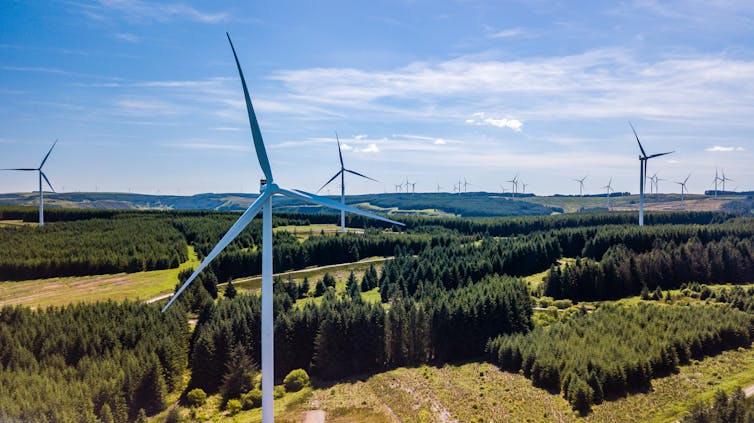
The day before new UK chancellor Kwasi Kwarteng’s mini-budget plan for economic growth, a pound would buy you about $1.13. After financial markets rejected the plan, the pound suddenly sunk to around $1.07. Though it has since rallied thanks to major intervention from the Bank of England, the currency remains volatile and far below its value earlier this year.
A lot has been written about how this will affect people’s incomes, the housing market or overall political and economic conditions. But we want to look at why the weak pound is bad news for the UK’s natural environment and its ability to hit climate targets.
1. The low-carbon economy just became a lot more expensive
The fall in sterling’s value partly signals a loss in confidence in the value of UK assets following the unfunded tax commitments contained in the mini-budget. The government’s aim to achieve net zero by 2050 requires substantial public and private investment in energy technologies such as solar and wind as well as carbon storage, insulation and electric cars.
But the loss in investor confidence threatens to derail these investments, because firms may be unwilling to commit the substantial budgets required in an uncertain economic environment. The cost of these investments may also rise as a result of the falling pound because many of the materials and inputs needed for these technologies, such as batteries, are imported and a falling pound increases their prices.

Richard Whitcombe / shutterstock
2. High interest rates may rule out large investment
To support the pound and to control inflation, interest rates are expected to rise further. The UK is already experiencing record levels of inflation, fuelled by pandemic-related spending and Russia’s war on Ukraine. Rising consumer prices developed into a full-blown cost of living crisis, with fuel and food poverty, financial hardship and the collapse of businesses looming large on this winter’s horizon.
While the anticipated increase in interest rates might ease the cost of living crisis, it also increases the cost of government borrowing at a time when we rapidly need to increase low-carbon investment for net zero by 2050. The government’s official climate change advisory committee estimates that an additional £4 billion to £6 billion of annual public spending will be needed by 2030.
Some of this money should be raised through carbon taxes. But in reality, at least for as long as the cost of living crisis is ongoing, if the government is serious about green investment it will have to borrow.
Rising interest rates will push up the cost of borrowing relentlessly and present a tough political choice that seemingly pits the environment against economic recovery. As any future incoming government will inherit these same rates, a falling pound threatens to make it much harder to take large-scale, rapid environmental action.
3. Imports will become pricier
In addition to increased supply prices for firms and rising borrowing costs, it will lead to a significant rise in import prices for consumers. Given the UK’s reliance on imports, this is likely to affect prices for food, clothing and manufactured goods.
At the consumer level, this will immediately impact marginal spending as necessary expenditures (housing, energy, basic food and so on) lower the budget available for products such as eco-friendly cleaning products, organic foods or ethically made clothes. Buying “greener” products typically cost a family of four around £2,000 a year.
Instead, people may have to rely on cheaper goods that also come with larger greenhouse gas footprints and wider impacts on the environment through pollution and increased waste. See this calculator for direct comparisons.
Of course, some spending changes will be positive for the environment, for example if people use their cars less or take fewer holidays abroad. However, high-income individuals who will benefit the most from the mini-budget tax cuts will be less affected by the falling pound and they tend to fly more, buy more things, and have multiple cars and bigger homes to heat.
This raises profound questions about inequality and injustice in UK society. Alongside increased fuel poverty and foodbank use, we will see an uptick in the purchasing power of the wealthiest.
What’s next
Interest rate rises increase the cost of servicing government debt as well as the cost of new borrowing. One estimate says that the combined cost to government of the new tax cuts and higher cost of borrowing is around £250 billion. This substantial loss in government income reduces the budget available for climate change mitigation and improvements to infrastructure.
The government’s growth plan also seems to be based on an increased use of fossil fuels through technologies such as fracking. Given the scant evidence for absolutely decoupling economic growth from resource use, the opposition’s “green growth” proposal is also unlikely to decarbonise at the rate required to get to net zero by 2050 and avert catastrophic climate change.
Therefore, rather than increasing the energy and materials going into the economy for the sake of GDP growth, we would argue the UK needs an economic reorientation that questions the need of growth for its own sake and orients it instead towards social equality and ecological sustainability.![]()
————————
This blog is written by Cabot Institute for the Environment members Dr Katharina Richter, Lecturer in Climate, Politics and Society, University of Bristol; Dr Alix Dietzel, Senior Lecturer in Climate Justice, University of Bristol, and Professor Alvin Birdi, Professor of Economics Education, University of Bristol. This article is republished from The Conversation under a Creative Commons license. Read the original article.




